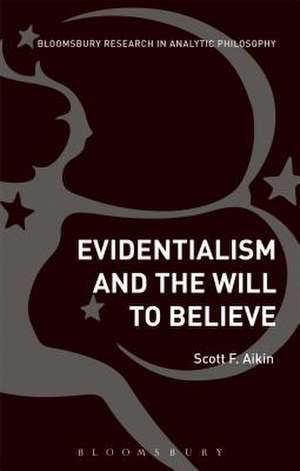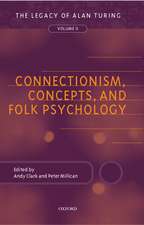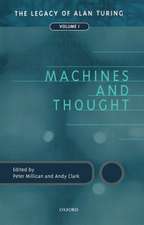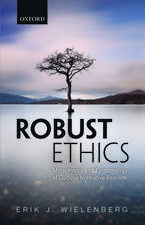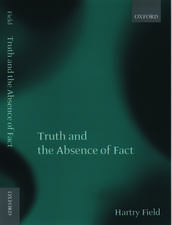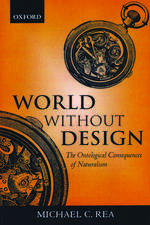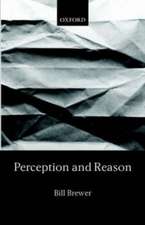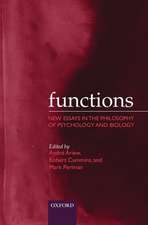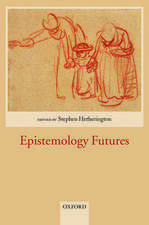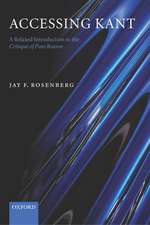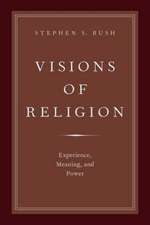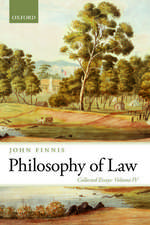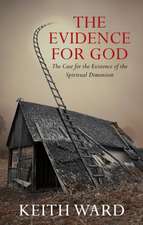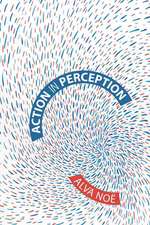Evidentialism and the Will to Believe
Autor Scott Aikinen Limba Engleză Paperback – 18 noi 2015
| Toate formatele și edițiile | Preț | Express |
|---|---|---|
| Paperback (1) | 257.03 lei 6-8 săpt. | |
| Bloomsbury Publishing – 18 noi 2015 | 257.03 lei 6-8 săpt. | |
| Hardback (1) | 773.65 lei 6-8 săpt. | |
| Bloomsbury Publishing – 21 mai 2014 | 773.65 lei 6-8 săpt. |
Preț: 257.03 lei
Preț vechi: 295.14 lei
-13% Nou
Puncte Express: 386
Preț estimativ în valută:
49.18€ • 51.49$ • 40.70£
49.18€ • 51.49$ • 40.70£
Carte tipărită la comandă
Livrare economică 05-19 aprilie
Preluare comenzi: 021 569.72.76
Specificații
ISBN-13: 9781474265836
ISBN-10: 1474265839
Pagini: 240
Dimensiuni: 156 x 234 x 25 mm
Greutate: 0.34 kg
Editura: Bloomsbury Publishing
Colecția Bloomsbury Academic
Locul publicării:London, United Kingdom
ISBN-10: 1474265839
Pagini: 240
Dimensiuni: 156 x 234 x 25 mm
Greutate: 0.34 kg
Editura: Bloomsbury Publishing
Colecția Bloomsbury Academic
Locul publicării:London, United Kingdom
Caracteristici
Provides a history of the issues surrounding the debate between evidentialists and anti-evidentialists
Notă biografică
Scott F. Aikin is Assistant Professor of Philosophy at Vanderbilt University, USA.
Cuprins
AcknowledgmentsCopyright AcknowledgmentsIntroduction1. The objectives of commentary2. Three themes3. Five evaluative thesesChapter 1: Reading Clifford's "The Ethics of Belief"William Kingdon Clifford and the Metaphysical SocietySection I - The Duty of Inquiry1. The ship owner case2. The island case3. Beliefs and actions4. Beliefs and their consequences5. Ethics and belief6. Endorsing evidentialismSection II - The Weight of Authority1. Anti-skepticism2. Testimonial evidence3. Miraculous testimony4. The publicity requirement5. The sacred tradition of humanitySection III - The Limits of Inference1. A burnt child dreads the fire2. Regulative principles3. Three normsChapter 2: Reading James's "The Will to Believe"William James and "The Will to Believe"PreambleSection I - Hypotheses and Options1. Introduction and definitions2. Live and dead options3. Forced options4. Momentous options 5. Religion as a genuine optionSection II - Pascal's Wager1. Four stages of "The Will to Believe"2. Voluntarism and its limits3. The wager4. Clifford's vetoSection III - Psychological Causes of Belief1. A concession to evidentialism2. Truth and other useful ideas3. Pascal is a regular clincherSection IV - The Thesis of the Essay1. A thematic transition2. The thesisSections V and VI - Absolutism and Empiricism1. Two forms of faith2. Objective evidence and its discontents3. Truth for EmpricismSection VII - Two Different Sorts of Risks in Believing1. The two commandments2. The case for the Truth Norm3. Two critical pointsSection VIII - Some Risk Unavoidable1. Applying the meta-epistemology2. Interested inquiry3. Two analogiesSection IX - Faith May Bring Forth Its Own Verification1. Moral and scientific questions2. Moral skepticism3. The argument from friendship4. The argument from social coordination5. Doxastic efficacy and the will-to-believeSection X - Logical Conditions of Religious Belief1. The overall form of James's argument2. Religion's dual essence3. Religion as live and momentous4. Religion as forced5. The conversion fallacy6. Religion as doxastically efficacious7. Evidentialism as irrational8. Religious toleranceChapter 3: The Ethics of Belief and Philosophy of ReligionQuestion 1: Must evidentialism be an ethical doctrine?Question 2: Can practical reasons trump theoretical reasons?Question 3: Can religion be pragmatically reconstructed?Question 4: What about the power of positive thinking?BibliographyIndex
Recenzii
[Aikin] writes with clarity and verve, and his discussion is uniformly insightful. The book is filled with telling examples, useful distinctions, trenchant arguments, and good humor. I recommend it with enthusiasm.
Evidentialism and the Will To Believe is refreshingly humorous and informal ... Aikin's blend of casual and technical language offers readers respite and entertainment; fellow analytical philosophers should take note ... An essential primer for those wishing to understand the Clifford-James debate
Aikin critically evaluates William James's famous influential essay "The Will to Believe" (1897) and W. K. Clifford's lesser-known "The Ethics of Belief" (1877), which the former critiqued. This is the first complete book to analyze and contrast these two important theories of belief in epistemology . Aikin's clear writing style enables readers to better understand them. This reviewer has taught these essays many times but still learned from this volume. It will be very useful for courses in epistemology and related subjects. Summing Up: Highly recommended. Graduate students and researchers/faculty.
Aikin's book is a detailed, meticulous, and thought provoking comparative study of two seminal papers on the ethics of belief: William Clifford's 'The Ethics of Belief,' which enjoins us always to believe in accordance with the evidence, and William James' 'The Will to Believe,' which defends our right to believe in some carefully circumscribed circumstances, even when the evidence is insufficient . It makes good sense to discuss the two papers together. After all, James was responding to Clifford. And the detailed discussion acquaints the reader with the two thinkers' stances toward a host of issues that together make for comprehensive views concerning evidentialism.
The positions of both James and Clifford are presented in a thorough and sensitive manner.
Scott Aikin has produced an excellent, comprehensive, and much-needed account of the still vital Clifford-James debate on the ethics of belief and the will to believe.
I highly recommend this book to anyone wanting a reliable introduction to these classic works on the ethics of religious belief. It provides a careful, patient and entertaining companion to these classic texts by Clifford and James on evidence, belief, and especially religious belief. It would make the basis of a great short course.
Scott F Aikin has provided an invaluable guide to the writings of Clifford and William James, on the Ethics of Belief and James's defence of 'The will to believe'. Their debates are fundamental to the history of pragmatism, and Aikin's commentary provides an illuminating guide to the arguments that were employed.
Scott Aikin brings clarity, fairness, and critical insight to bear on the Clifford-James controversy over what we may believe without adequate evidence. People who want to understand the dispute should read Evidentialism and the Will to Believe before they read anything else.
This is the first book-length treatment of what is arguably the most important and influential epistemological debate from dawn of what we consider the 'contemporary' philosophical era. Written in a clear and lively fashion, Aikin's book is not only the best account of the James/Clifford debate ever to appear in print, but also an ideal introduction to the topic of evidentialism itself.
Evidentialism and the Will To Believe is refreshingly humorous and informal ... Aikin's blend of casual and technical language offers readers respite and entertainment; fellow analytical philosophers should take note ... An essential primer for those wishing to understand the Clifford-James debate
Aikin critically evaluates William James's famous influential essay "The Will to Believe" (1897) and W. K. Clifford's lesser-known "The Ethics of Belief" (1877), which the former critiqued. This is the first complete book to analyze and contrast these two important theories of belief in epistemology . Aikin's clear writing style enables readers to better understand them. This reviewer has taught these essays many times but still learned from this volume. It will be very useful for courses in epistemology and related subjects. Summing Up: Highly recommended. Graduate students and researchers/faculty.
Aikin's book is a detailed, meticulous, and thought provoking comparative study of two seminal papers on the ethics of belief: William Clifford's 'The Ethics of Belief,' which enjoins us always to believe in accordance with the evidence, and William James' 'The Will to Believe,' which defends our right to believe in some carefully circumscribed circumstances, even when the evidence is insufficient . It makes good sense to discuss the two papers together. After all, James was responding to Clifford. And the detailed discussion acquaints the reader with the two thinkers' stances toward a host of issues that together make for comprehensive views concerning evidentialism.
The positions of both James and Clifford are presented in a thorough and sensitive manner.
Scott Aikin has produced an excellent, comprehensive, and much-needed account of the still vital Clifford-James debate on the ethics of belief and the will to believe.
I highly recommend this book to anyone wanting a reliable introduction to these classic works on the ethics of religious belief. It provides a careful, patient and entertaining companion to these classic texts by Clifford and James on evidence, belief, and especially religious belief. It would make the basis of a great short course.
Scott F Aikin has provided an invaluable guide to the writings of Clifford and William James, on the Ethics of Belief and James's defence of 'The will to believe'. Their debates are fundamental to the history of pragmatism, and Aikin's commentary provides an illuminating guide to the arguments that were employed.
Scott Aikin brings clarity, fairness, and critical insight to bear on the Clifford-James controversy over what we may believe without adequate evidence. People who want to understand the dispute should read Evidentialism and the Will to Believe before they read anything else.
This is the first book-length treatment of what is arguably the most important and influential epistemological debate from dawn of what we consider the 'contemporary' philosophical era. Written in a clear and lively fashion, Aikin's book is not only the best account of the James/Clifford debate ever to appear in print, but also an ideal introduction to the topic of evidentialism itself.
